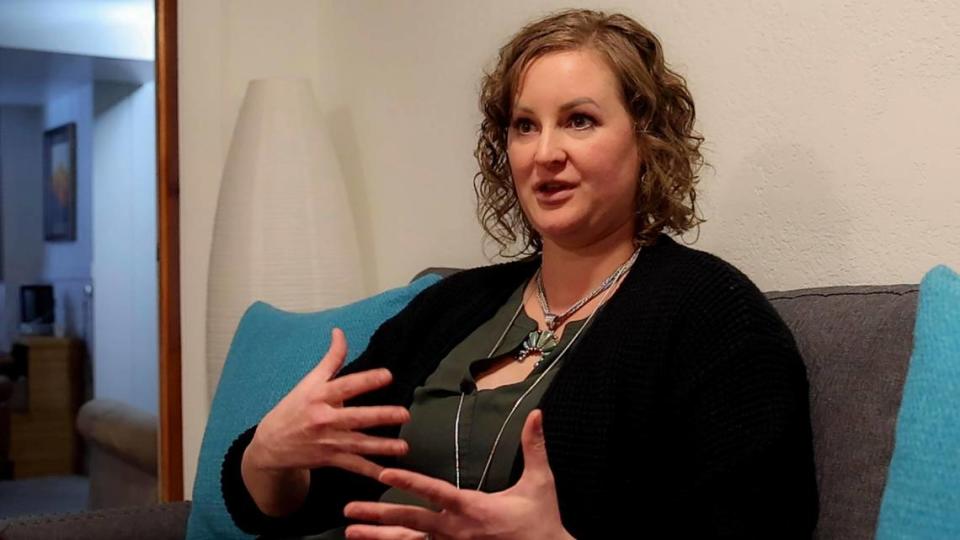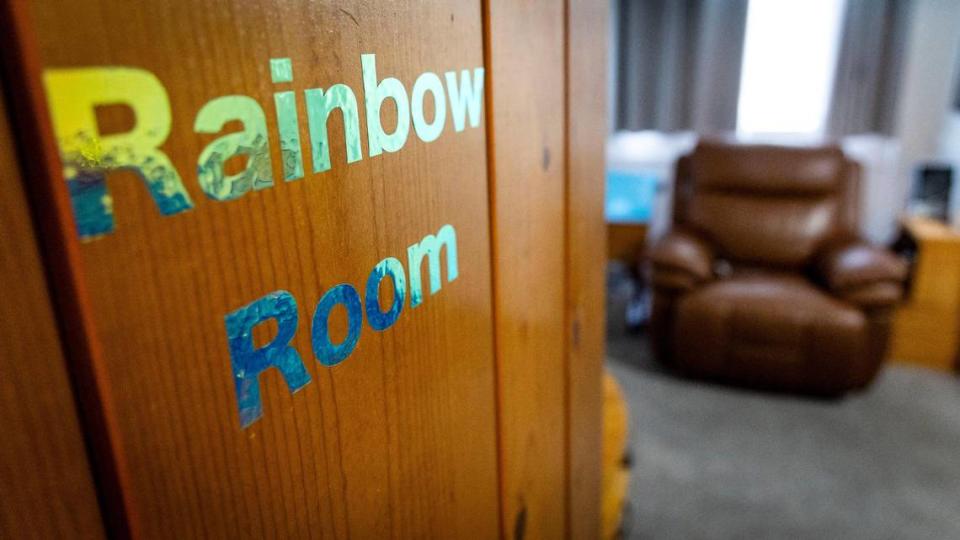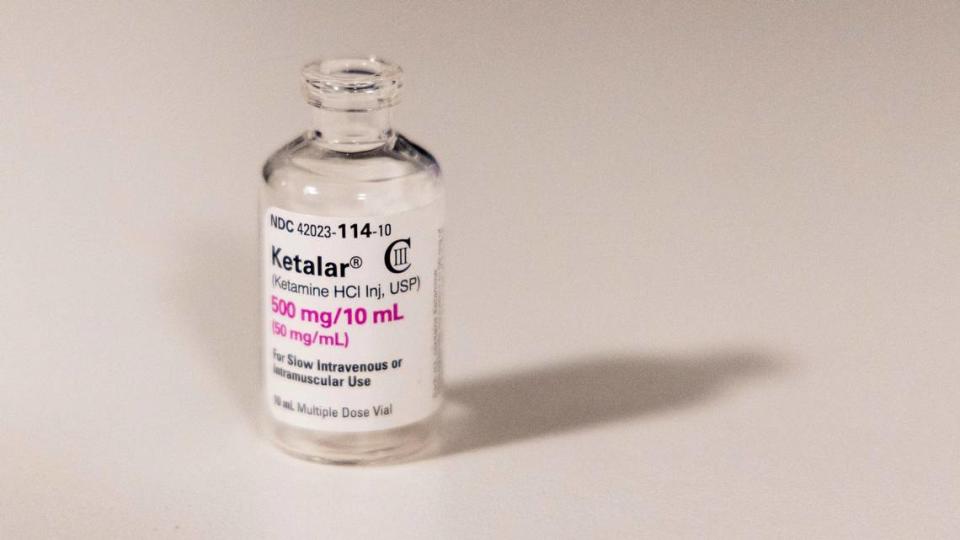A Boise clinic uses the drug ketamine to treat depression. Is it legal? How does it work?
Editor’s note: This story contains references to suicide. If you or someone you know is in crisis, call or text the 988 Suicide & Crisis Lifeline at 988.
Linda Gilbertson was depressed and anxious for much of her 63 years.
She grew up in a farming family in Canyon County, she said. Her father died by suicide 13 years ago. She says she has a genetic predisposition to mental illness. She tried taking medication for her depression and anxiety, but it never worked.
“I always felt like there was something missing,” Gilbertson said.
That was until she began taking small doses of ketamine at Boise Ketamine Clinic.
Ketamine is an anesthetic that has been approved in the United States by the Food and Drug Administration for use in a medical setting for anesthesia. It’s also classified by the U.S. Drug Enforcement Administration as a Schedule III controlled substance, meaning it has moderate to low potential for physical and psychological dependence. The only form of ketamine that is FDA-approved for treatment-resistant depression is Spravato, which includes one molecule of ketamine and only comes in the form of a nasal spray.
Ketamine is sometimes used illegally as a club drug, according to the DEA. Its use is popular among young crowds at dance clubs and raves because the drug produces dissociative sensations and hallucinations, the DEA said.
But in recent years ketamine has been used more widely by medical professionals to help people who struggle with severe depression that has not improved via other therapies, according to Harvard Medical School instructor Peter Grinspoon. Use of ketamine in a medical setting is legal in Idaho, according to the Idaho Division of Occupational and Professional Licenses. The FDA warned in October that it is “aware that compounded ketamine products have been marketed for a wide variety of psychiatric disorders … however, FDA has not determined that ketamine is safe and effective for such uses.”
Gilbertson and other patients who have sought treatment from Boise Ketamine Clinic fit the criteria for having long-term and previously treatment-resistant depression and anxiety, said Nykol Bailey Rice, the owner and founder of the clinic.
Rice, a certified registered nurse anesthetist, has run Boise Ketamine Clinic for eight years. She was inspired to open the clinic in 2015 on the Bench after losing someone to suicide.
“I just felt like if there was a way to prevent that kind of loss from happening for other families, it was worth pursuing,” Rice said by phone.

What is ketamine therapy?
Ketamine has been used in the U.S. as an anesthetic since the 1960s, Rice said, speaking to the Idaho Statesman on a recent afternoon from a room at the clinic. She said it is “incredibly safe.” Rice gives her patients low doses of ketamine through injections or lozenges and monitors them throughout the process.

“What we’re doing is a micro dose of ketamine, which is inducing a nonordinary state of consciousness that allows for us to work with people in a different way, under a therapeutic type of context,” Rice said. “It allows us to do a little bit deeper work.”
Ketamine quiets the amygdala in the brain, which is a small part of the brain that processes emotions, or the “fight or flight part of the brain,” Rice said. That allows patients to sit with their emotions without fighting and allows a therapist to “work with them in a way that feels safe,” Rice said.
Ketamine treatments are part of the growing use of psychedelic drugs to treat medical conditions. Ketamine is the only drug that has psychedelic effects that can be legally prescribed in the United States. But some states, like Oregon and Colorado, have legalized use of the party drug MDMA, or ecstasy, and psilocybin, or mushrooms, for mental health treatments under supervision.
Research has shown that MDMA therapy can treat PTSD, and it is moving toward approval by the U.S. Food and Drug Administration, according to The New York Times. Similar research has shown that clinical trials of psilocybin have “produced promising results concerning the treatment of addiction, depression and end-of-life mood disorders,” according to an analysis from five people from the St. George’s University School of Medicine.
The Boise Ketamine Clinic was the first ketamine clinic in Idaho and among the first 10 or 11 ketamine clinics to open across the country, Rice said. Since then, more clinics have opened in Idaho.
A patient can choose between ketamine infusion therapy, where the patient takes a low dose of ketamine each session and sits at the clinic for about an hour; and ketamine-assisted therapy, during which a patient is guided through therapy by Marisa Radha Weppner, a ketamine-assisted therapy facilitator. For patients wanting to dig deeper into their trauma, the clinic also offers ketamine-assisted psychotherapy.
Therapy generally helps patients with specific issues like addiction or grief, according to Very Well Mind, a website with mental health resources. Psychotherapy explores issues in a patient’s past that may be contributing to day-to-day emotional and mental challenges.
“During a (ketamine-assisted psychotherapy) session, one of the counselors will be present during the session to help guide you through the experience as you engage in the therapeutic process,” the clinic’s website said. “While under the effects of ketamine, you and the counselor will explore some of the core wounds and limiting beliefs that hold you back from thriving while traveling the inner psychic space of your own consciousness.”
Dr. Lisa Harding, a Yale University professor and member of the American Psychiatric Association, said ketamine should not be used as a standalone therapy. In an email to the Statesman and in an article for the Journal of the American Academy of Psychiatry and the Law, Harding wrote that while ketamine is common and has proved successful in clinical trials to treat “treatment-resistant psychiatric disorders,” more research needs to be done to support the use of ketamine to treat psychiatric disorders like bipolar depression, PTSD and obsessive-compulsive disorder.

Harding is concerned about the lack of regulation of ketamine clinics and said more research is needed on the effects of ketamine and its potential for abuse.
She also says that there is no evidence showing that psychotherapy is necessary during ketamine therapy. “In fact, we do not have evidence that it’s not harmful,” she said by email.
”Friends” actor Matthew Perry, 54, died Oct. 28 from “the acute effects of ketamine,” the Los Angeles County medical examiner said Dec. 15.
Michael Sapiro, a clinical psychologist, guides ketamine-assisted psychotherapy for veterans and first responders at Boise Ketamine Clinic. He has been a therapist and a yoga and meditation instructor for 27 years. Even before getting into ketamine-assisted therapy, Sapiro said, he worked to “help people access what they’re most longing for in their life, the deepest changes or healing and untended grief.”
Since starting as a ketamine-assisted therapist, Sapiro said, he has found that people are able to truly relax under ketamine.
“Most of us who have any kind of trauma are very rigid and controlled,” Sapiro said, by phone. “We’re scared, we’re holding tight. And that’s not only physiologically in the body, but we’re also holding psychologically tight, too, because we don’t feel safe, and that usually means we don’t feel safe in ourselves either.”
At the Boise Ketamine Clinic, the cost of ketamine is $350 per session in lozenge form, which is self-guided with monitoring from a nurse for 40 minutes to an hour, and $600 per session for therapist-guided ketamine-assisted therapy or psychotherapy.
Insurance does not cover the cost. Rice said most patients she sees do a series of six sessions, which could cost up to $3,600.

What type of patient benefits from ketamine treatment?
Rice said the clinic has had patients ages 12 to 90. The common profile of a patient at the clinic is someone who is at risk of suicide, she said.
“We have seen several veterans who have come through and that has been very helpful for them,” Rice said. “A lot of people come in because they’re really worried for their loved one’s safety.”
Sapiro specializes in helping veterans, police officers, paramedics and firefighters in ketamine-assisted therapy.
“My expertise is in trauma and post-traumatic stress disorder,” Sapiro said. “I do work often in the realm of significant childhood trauma, which surprisingly many of our first responders and veterans have as well. They think they are coming in after a traumatic call or critical incident. And what ends up coming out is something about losing their mother or father or the way they were treated when they were younger, which set a pattern for their whole life.”
Ketamine breaks down the walls in many people’s brains that could be preventing them from addressing the roots of their depression or anxiety, Sapiro said.
Gilbertson knows Sapiro, because they are both in the Boise yoga and meditation community. Gilbertson’s story of constant depression and anxiety that seemed untreatable is shared by many of Sapiro’s patients, he said.
Gilbertson was diagnosed with complex PTSD, a mental health condition that stems from chronic trauma, according to the Cleveland Clinic. It is different from PTSD because of the length of time the patient experienced trauma. The Cleveland Clinic said that with research, experts “realized that people who experience long-term, repeated trauma tend to have other symptoms in addition to the symptoms of PTSD.”
Gilbertson, who lives in Boise and works as a yoga instructor, first found out about ketamine-assisted therapy through Sapiro, and one of her first appointments at the clinic was a ketamine-assisted psychotherapy session with him.
She has been getting ketamine injections for a year and a half, and she gets them once per month. Each injection costs $400, she said.
“It’s just been incredible,” Gilbertson said. “It’s like a miracle. It was really helpful in digging up a lot of things from my childhood that I had never processed, and it’s painful. But at the same time, it’s so freeing to know the truth.”
4 student suicides in less than two months send shocks through Boise schools. ‘It’s terrifying’
New Boise venue will help disabled veterans, athletes ‘get the most out of their lives’

